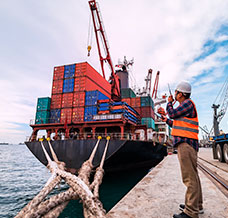Longshore & Harbor Workers’ Compensation
Longshore and Harbor Workers' Compensation Attorney
The longshore attorneys at Mithoff Law know that any job on or near an open body of water presents unique dangers to workers. And while the Jones Act may not cover all offshore workers, there are other laws providing workers’ compensation, medical benefits, and more to injured harbor workers and other civilian employees injured on the job.
If you or a loved one have been seriously injured or killed during an offshore accident, navigating complex maritime laws to determine your options can be a challenge. Don’t get lost in red tape; let an experienced longshore attorney fight for you.
Learn more about the Longshore and Harbor Workers’ Compensation Act (LHWCA) and contact the experienced longshore attorneys at Mithoff Law by calling 713-654-1122.
“Mithoff, a Houston personal injury lawyer, is no stranger to winning big payoffs for large groups of people. He negotiated a $2.3 billion settlement with the tobacco industry for Harris and other counties, and he won $80 million for residents of a nursing home who were killed in a 2005 bus explosion while fleeing Hurricane Rita.”
– Houston Chronicle, November 22, 2017
What is the Longshore and Harbor Workers’ Compensation Act?
Originally enacted in 1958, the Longshore and Harbor Workers’ Compensation Act, commonly known as LHWCA, extends workers’ compensation-style benefits to offshore workers not covered by the Jones Act.
Maritime employees who may be eligible for benefits under LHWCA include longshoremen, harbor and dock workers, those employed on military bases, shipyard employees, and other civilians who aren’t classified as seamen but still work near a body of water.
While non-seamen maritime workers are still eligible for benefits through the workers’ compensation programs office, the benefits offered by the LHWCA are often more beneficial than state workers’ comp benefits, covering a greater percentage of your lost weekly wages as well as permanent partial disability benefits.
Longshore and Harbor Workers’ Compensation Act benefits
Maritime employees who meet the criteria for LHWCA benefits can receive several monetary benefits for their workplace injury, including both temporary and permanent benefits for total and partial disabilities.
Additionally, the LHWCA provides for injured maritime employees to have their medical treatment covered in addition to any toll, parking, or other associated fees necessary to obtain treatment.
Who qualifies for benefits under the Longshore and Harbor Workers’ Compensation Act?
Because the benefits provided by LHWCA are often more generous than those provided by traditional workers’ compensation, LHWCA has established two criterion maritime employees must satisfy in order to be eligible for benefits: the status test and the situs test.
The status test is used to determine whether or not your work can truly be considered maritime work, meaning a significant portion of your time on the job involves water, marine transport, or contributes to the maritime nature of your employer’s business. Employees who may qualify for LHWCA benefits include:
- Longshoremen
- People who load/unload ships
- Ship repairpeople
- Shipbuilders
- Truck drivers who assist with offshore shipping containers
However, not all employees whose work involves bodies of water satisfy the status test. The Longshore and Harbor Workers’ Compensation Act specifically excludes the following types of employees from coverage:
- Marina employees who do not participate in its construction or expansion (i.e., administrative staff)
- Shipbuilders and/or mechanics who work on recreational boats under 65 feet long
- Aquaculture workers
- Captains or crewmembers on navigable vessels
The situs test
In order to pass situs test requirements, the location where you work must be on, near, or adjacent to navigable water. Generally speaking, to pass the situs test your work must be within about one mile of navigable water, either on a vessel, dock, wharf, terminal, shipyard, or any other maritime worksite.
Contact a longshore attorney at Mithoff Law today
The Longshore and Harbor Workers’ Compensation Act may be there to protect maritime workers, but that doesn’t always mean that winning benefits is a straightforward process. The situs and status tests aren’t always cut and dry, and disputes over seemingly minor details of your employment can keep you and your family from receiving the benefits you desperately need.
Get help from the experienced longshore attorneys at Mithoff Law. We are here to fight for you with the trial-tested strategies these complex cases require.
Call us today at 713-654-1122 and get your case off to the right start.
